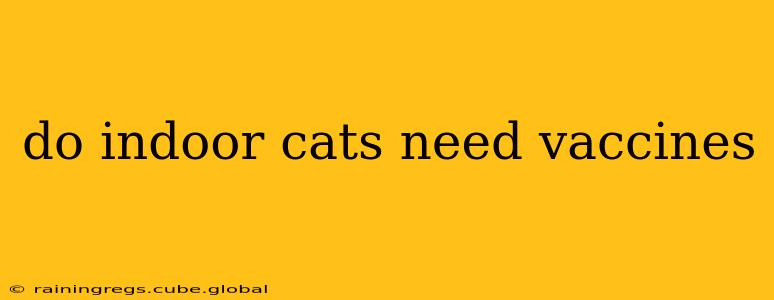Do Indoor Cats Need Vaccines? A Comprehensive Guide for Cat Owners
While many believe indoor cats are safe from the diseases prevented by vaccines, the truth is a bit more nuanced. The simple answer is yes, indoor cats generally still need vaccines, although the specific vaccines and vaccination schedule might differ from their outdoor counterparts. Completely eliminating the risk of disease exposure is nearly impossible, even for cats who never set a paw outside.
Here's a breakdown of why vaccination remains crucial for indoor cats, addressing common concerns and questions:
Why Vaccinate Indoor Cats? Aren't They Protected?
Even strictly indoor cats are vulnerable to several contagious diseases. Exposure can happen through seemingly innocuous means:
- Contaminated clothing or shoes: Disease-causing pathogens can easily hitch a ride on your clothes or shoes after you've been outdoors. A simple touch to your cat can transmit these pathogens.
- Open windows and doors: Airborne viruses can enter your home through even slightly open windows or doors.
- Infected visitors: If someone visits your home with an infected pet, your cat could be exposed.
- Prey animals: Even if you don't bring wildlife into the house, a stray mouse could carry and transmit diseases.
- Infected fleas: Fleas can be carriers of diseases such as feline immunodeficiency virus (FIV), even if the flea itself doesn't directly cause the disease.
What Vaccines Do Indoor Cats Need?
The core vaccines recommended for most cats, regardless of lifestyle, are:
- Feline Herpesvirus 1 (FHV-1) and Feline Calicivirus (FCV): These viruses cause upper respiratory infections, which can be severe and even fatal in kittens or cats with weakened immune systems.
- Feline Panleukopenia Virus (FPV): Also known as feline distemper, this highly contagious virus can be deadly.
These are typically given as a combination vaccine. Your veterinarian will determine the best vaccination schedule for your cat based on factors like age and health status.
Some veterinarians may also recommend additional vaccines, such as:
- Rabies: This is a legally mandated vaccine in many jurisdictions, regardless of whether your cat is indoor or outdoor. Rabies is a deadly disease affecting both animals and humans.
- Feline Leukemia Virus (FeLV): While less of a concern for indoor cats, FeLV can be transmitted through saliva, nasal secretions, or blood, and it's a serious disease. Testing for FeLV antibodies is usually done before administering the vaccine.
How Often Should Indoor Cats Be Vaccinated?
The vaccination schedule for indoor cats usually involves a series of initial vaccinations followed by booster shots. Your vet will advise you on the appropriate frequency, but generally, the core vaccines will need booster shots every one to three years. Rabies vaccines usually need to be repeated every 1-3 years, depending on the specific vaccine used and local regulations.
Are There Any Risks Associated with Cat Vaccines?
Like any medical procedure, vaccines carry a small risk of mild side effects, such as temporary lethargy, mild fever, or soreness at the injection site. Severe reactions are rare. Your veterinarian will discuss the potential risks and benefits of vaccination with you before administering the shots.
My Cat is a Kitten. What's the Vaccination Schedule?
Kitten vaccination schedules typically begin around 6-8 weeks of age, with subsequent doses given every 2-4 weeks until they are around 16 weeks old. Your vet will create a schedule tailored to your kitten's needs and health.
My Indoor Cat is Older. Does it Still Need Vaccines?
Even senior cats benefit from vaccines. Their immune systems may be weaker, making them more susceptible to disease. Your veterinarian can determine the appropriate vaccination schedule for your older cat.
In conclusion, while the risk of exposure to certain diseases is lower for indoor cats, vaccination remains a vital part of preventative care. Consult your veterinarian to determine the best vaccination plan for your cat's individual needs, ensuring they receive the protection they deserve and enjoy a long, healthy life.
